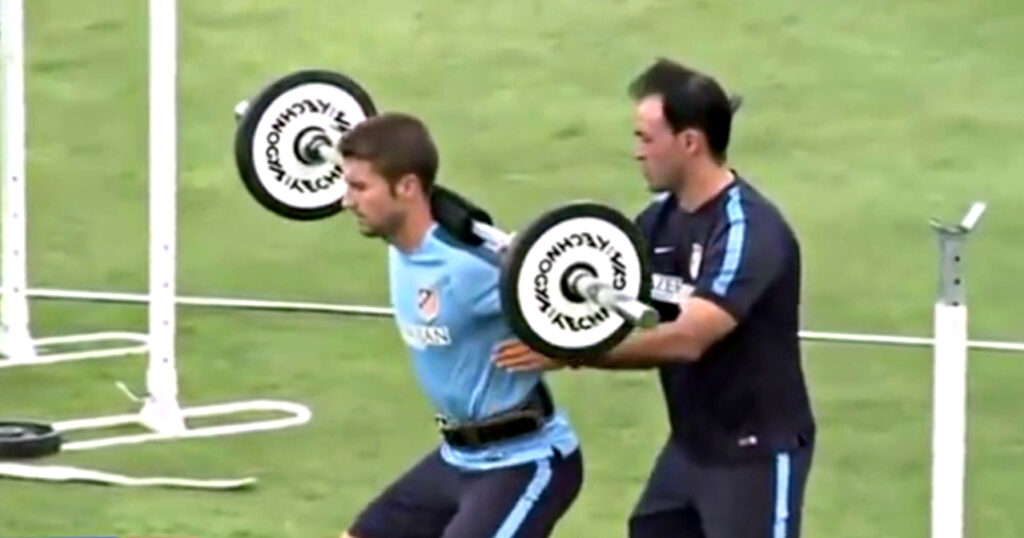Capitalist Conditioning for Rugby – Part 1: Rugby Epistemocrat
DISCLAIMER:
I am far more interested in what I don’t know than what I do. As such, if you have specific critiques of my points then I genuinely do wish to be educated and course corrected.
Let us begin.
Before we go deep in the weeds we need to define terms so that we are all singing form the same hymn sheet. Given the expansion of terms needed, I deemed it more suitable to define the terminology from the title in reverse order starting with Rugby.
Rugby
In its most basic sense, Rugby is a full contact collision field sport that is essentially socially approved simulated tribal warfare. It is played with 15 players on each team and over 2 halves, each approximating 40minutes depending on injuries. From a task specificity perspective (energy system stress, physical collisions, force output requirements, running velocities, technical/tactical/strategic components, etc.), it falls somewhere on a spectrum in between American Football and Australian Rules Football while of course varying in similarity to each end of said spectrum by positional demands.
Conditioning
Percy Cerutty (1895-1975) was the coach most notably of Herb Elliot who, along with many other accomplishments, won gold in the 1500m at the 1960 Rome Olympics whilst also setting a world record in the event. Cerutty was also the author of a half dozen books that pragmatically blurred the lines between the disciplines of philosophy, psychology and physical preparation. He had his own philosophical bent that he termed “Stotan” which was a blend of concepts he found useful from Stoicism and the Spartan culture.
He was a broad reader and deep thinker who’s poetic writings reflect this breadth and depth. One such example of his insightful poeticism being from his book “Athletics: How to become a Champion” and is his definition for “conditioning”. I find this definition to not only to be exceedingly useful conceptually, but also personally to stir goose bumps upon reading. It goes as follows:
“Anything that conspires to make us stronger, freer, more resilient, conquering, all that trains us to endure, to sustain suffering, that calls on our best qualities, continually–is conditioning.”
The above definition by Cerutty pretty much encapsulates everything a physical preparation coach does. With this definition of “conditioning”, the title “Strength and Conditioning” coach is a misnomer as the “strength” bit would inherently be included in the “conditioning” bit (along with everything else that helps them perform in their sport including all their more Rugby specific work). One who works in the physical preparation of athletes could just call oneself a Conditioning Coach and be done with it. However, I realize that the word “conditioning” has connotations associated with it that relate to energy systems and general work capacity development in not just Rugby but in general sporting parlance. This definition by Joel Jamieson from his book Ultimate MMA Conditioning is closer to this connotation:
“…conditioning is a measure of how well an athlete is able to meet the energy production demands of their sport.”
Even then, however, what determines how well an athlete is able to meet the energy production demands of their sport is basically every aspect of their preparation including but not limited to their strength work, speed work, skill work, technical / tactical / strategic capabilities, perception-action coupling, movement efficiency, emotional regulation, etc.
Basically, in its most simple sense, what I mean by “conditioning” for the purposes of this piece is what a lot of coaches refer to when discussing the heavy breathing huffing and puffing stuff done by players, either with or without the ball, and with the explicit purpose of developing “fitness”. This association with “fitness” is the connotation I was referring to in the title and hence is what “conditioning” is to refer to for the rest of this piece.
Capitalist
In order to explain why I used the term “capitalist” to describe an approach to coaching Rugby conditioning, I want to first describe what the antithesis of the approach I am putting forward is—Marxist coaching. This is because I equate how a lot of training planning that is carried out, to be a sporting equivalent to the economic philosophies that Marxism represents. Marxist coaching is a term I use to describe rigid top down training planning which I define as follows:
Top Down Training Planning (TDTP) is essentially forcing a rigid plan down onto a person and is to physical preparation what Marxism is to economics. This is because Marxism is a utopian pipedream based around the naïve idea that one can take all relevant factors into account and effectively centrally plan for the needs of a society from the top down. TDTP, like Marxism, places the information we do know on a higher pedestal than the information we do not know (epistemic arrogance) and represents the attempted rigid imposition of expectation.
Marxism represents epistemic arrogance because it doesn’t take into account the fact that a human society is a complex system. According to Nassim Nicholas Taleb in his book Skin in the Game:
“The main idea behind complex systems is that the ensemble behaves in ways not predicted by the components. The interactions matter more than the nature of the units. Studying individual ants will almost never give us a clear indication of how the ant colony operates. For that, one needs to understand an ant colony as an ant colony, no less, no more, not a collection of ants. This is called an “emergent” property of the whole, by which parts and whole differ because what matters are the interactions between such parts.”
Human societies are complex systems due to the interactions between people leading to emergent properties that are not determinable through the study of the isolated individuals. To make matters more chaotic, the individual humans themselves are in fact complex systems as well. This is the major crux of why Marxism is so arrogant in relation to epistemology—it thinks it has sufficient knowledge to optimally centrally plan for the needs of a complex system made up of other complex systems. The sheer scale of unknowledge is simply too enormous for this to even approach feasible.
I used the term “capitalist” in the title as it is the concept related to my ideas I think most people would likely be familiar with. What capitalism is actually seen as is dependent on the context. What I am using the concept in reference to is what I see to be its fundamental usefulness; the fact that a decision driven market force is a great tool in the navigation of the uncertainty inherent to the complex system that an economy represents.
What has this to do with Rugby you may ask? Well, a team of players we coach is a complex system in that the interactions between the people involved leads to emergent properties not determinable by studying each player in isolation. And, as I mentioned above, each individual player involved is also a complex system with the external training stress imposed on the athlete due to our planning being just one factor of influence on that player which interacts with a whole host of other factors within that person to determine the resultant adaptation.
To put it another way, the complex system that a human represents means that it is not the specifics of an isolated training stress that determine how the person adapts, but it is how that specific stress interacts with their physiological environment.
This internal physiological environment determines whether a particular training stress is sub-adaptive training (SAT), maladaptive training (MAT), or Goldilocks adaptive training (GAT).
- SAT = The training is insufficiently stressful to drive further desired adaptation.
- MAT = The challenge presented by the training is too stressful and results in the person not adjusting adequately or appropriately.
- GAT = The training stress challenged them optimally in that it wasn’t too easy and SAT, and it wasn’t too challenging and MAT, it was just right.
For a certain player, at a certain time point, there is a GAT zone of training stress that will be conducive to inducing the desirable training stimulus. What this GAT zone may be for a specific individual player depends on a whole host of factors that influence the internal physiological environment including but not limited to the following:
- Interactions with other players and coaches
- Athletes beliefs and expectations
- Allostatic load considerations outside of training (work/study/relationship stress etc.)
- Fitness levels
- Training history
- Injury history/legacy
- Positional specialization (e.g. prop vs winger)
- Nutritional considerations (Calorie balance, macronutrient intakes, micronutrient intakes, etc.)
- The individual genetics/epigenetics that determine adaptation rates to certain stimuli
- Sleep quality and duration (I have personally known and also read about high-level athletes easily hitting 9-11 hours of sleep per 24 hour period which is a far sight more than the “average” person gets)
- Temporal relativity to matches (particularly in relation to (1) recovery after a match and (2) tapering/peaking practices to get ready for the next match)
As one can see, even with a non-exhaustive list like this there are evidently quite a few moving parts that can influence what a players GAT Zone for training may be for a particular training stress. Taking all of these factors into account as a coach is likely impractical and potentially impossible, even if you realize the flaws with a TDTP approach. Therefore, we need to plan for the fact that there are factors influencing the performance of an athlete that are unknown and even unknowable.
Viewing training planning for Rugby from the individual upward with epistemic humility like this might be called Bottom Up Training Planning (BUTP) which I define as follows:
Bottom Up Training Planning (BUTP) is essentially designing training that comes up through a person aiming to meet that person where they actually are and is to physical preparation what market forces are to economics. This is because market forces are based around the idea that one is unable to take all relevant factors into account and effectively centrally plan for the needs of a society from the top down. BUTP, like market forces, places the information we do not know on a higher pedestal than the information we do know (epistemic humility) and represents the attempted systematic navigation of uncertainty.
Rugby Epistemocrat
Using this market forces analogy from the BUTP definition, we can now look at both the complex systems concept and the GAT zone factors of influence I have mentioned, in combination. You see a player’s GAT zone for a particular training stress is an emergent property that arises due to the market force like interaction between all the factors that influence that player’s physiological environment—ALL the factors.
When you view it like this, it is obvious that there are too many relevant unknown and even unknowable strands of influential knowledge that relate to how the player will adapt to a stress we impose with our planning. Hence, the information we do not know needs to be seen as more important than the information we do. This is called epistemic humility as mentioned in the market forces influenced BUTP view and is opposed to the epistemic arrogance mentioned in the TDTP view, which I equated to Marxism.
Technically, from a standard economic perspective, the opposite of a centrally planned Marxist like system is free market anarchy. However, I am not referring to Marxism from a standard economic perspective, I am referring to Marxism from an epistemic perspective. From this view, the direct opposite to Marxism is in my opinion an epistemocracy as laid out by Nassim Nicholas Taleb in The Black Swan and is described as follows:
“Everyone has an idea of utopia… To me utopia is an epistomocracy, a society in which anyone of rank is an epistemocrat, and where epistemocrats manage to be elected. It would be a society governed from the basis of the awareness of ignorance, not knowledge.” – Nassim Nicholas Taleb
That said; capitalist market forces would likely still be utilized in a modern day epistemocratic utopia. This is because, as mentioned above, a decision driven market force is quite the useful tool when it comes to navigating uncertainty in the complex system than an economy represents.
From a Rugby perspective, a coach who places the awareness of the existence of unknown and even unknowable knowledge at the forefront of his mind when planning his conditioning, or any other aspect of his sport planning, might be called a Rugby Epistemocrat.
In the eyes of a Rugby Epistemocrat, training planning needs to come from the players upward rather than hope downward. Rigid TDTP is absurd, especially when it comes to a sport like Rugby where it is so easy to overcook players.
When it comes to training planning, what we do not know is far more important than what we do. As such, efficient planning needs to involve the bottom up systematic navigation of uncertainty and not the top down rigid imposition of expectation.
And where does one start when trying to do this? In my opinion, by honestly paying attention to what IS actually going on with the players, not to what one thinks OUGHT to be going on.
What does this mean from a practical sense when it comes to designing our conditioning? Well, it means planning in such a way to increase the probability of sitting players into GAT rather than SAT or MAT—Cerruty put it wonderfully simply when he said:
“When an athlete goes out to train, his body should dictate his needs and he runs according to its capacities and demands.” – Percy Cerutty
And what might this look like? In part 2 of this series I will describe some potentially useful methods as well take a deep look at why conditioning for Rugby might even useful at all.
Thank you for reading.
INFLUENCES AND SOURCES FOR FURTHER READING:
There are 8 figures of note from diverse fields whose work likely most influenced my thinking in the general area of uncertainty navigation that may be of interest to the reader to look up. They are as follows: Nassim Nicholas Taleb, Karl Popper, Percy Cerutty, John Kiely, Israel Halperin, Mike Tuchscherer, Eric Helms, and Marduk.











Responses